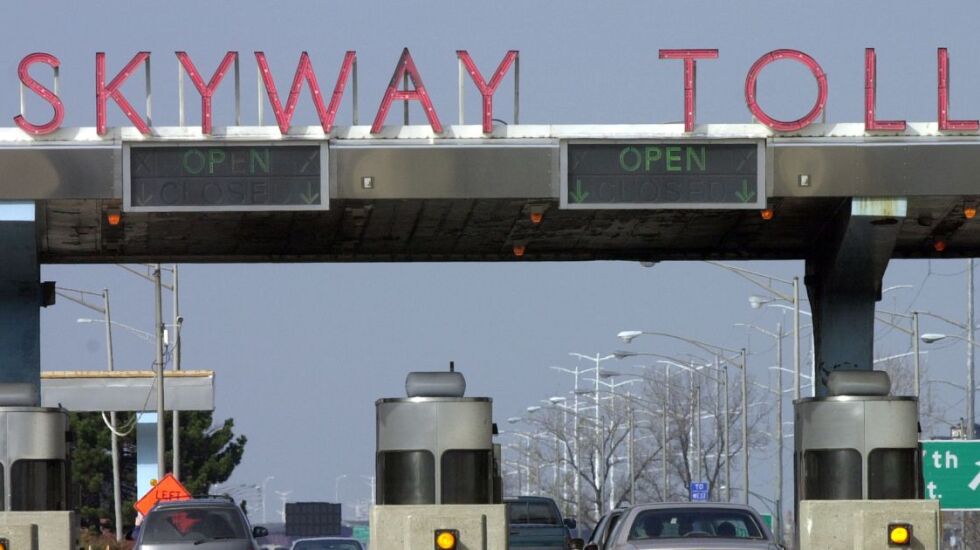
The Chicago Skyway is changing hands — for the second time in seven years — generating another transaction tax windfall for Chicago taxpayers.
Canadian pension plans that control the Skyway were looking to sell their one-third stakes for a handsome profit that valued the overall roadway at $4 billion, courtesy of drivers forking over tolls that have risen steadily since the city leased it to private operators in 2005.
The deal announced this week delivered, but not quite as much as the Canada Pension Plan Investment Board and OMERS Infrastructure, which invests for an Ontario municipal employees’ pension, had hoped.
The combined two-thirds stake was sold to Atlas Arteria Ltd., an Australian toll road company, for $2.014 billion. That price values the entire 7.8-mile toll road at $3 billion, $1 billion short of the price the two investors had envisioned.
The firms and the Ontario Teachers’ Pension Plan bought the lease in 2015 for $2.8 billion, $1 billion more than Chicago taxpayers got for the 99-year lease in 2004. The teachers’ pension plan plans to keep its one-third stake in the Skyway.
The latest ownership change is expected to generate a roughly $25 million windfall for Chicago taxpayers, enough to cut in half Mayor Lori Lightfoot’s $42.7 million pre-election property tax increase.
The mayor’s office refused to say how the money would be used, only that the latest sale is a “win for the city, generating a tax payment in the tens of millions of dollars.”
Former Mayor Richard M. Daley directed the original sale of the 99-year lease in what came to be known around City Hall as the Great Chicago sell-off.
The Skyway deal allowed operators to regularly increase tolls. The rate for cars on the 7.8-mile shortcut from Chicago to Indiana is now $5.90, while rates are much higher for vehicles with more than two axles. Drivers of cars paid $2 in 2004.
Dana Levenson, the former chief financial officer who engineered 2004 Skyway transaction, argued the latest sale shows how good a deal it really was.
“What are the implications for the value of the Skyway when it comes back to the city in 2104? Based on the equity value of $3 billion, it’s gonna be north of $15 billion in value,” Levenson said.
“If you do an inflation-adjusted calculation, that sale was superb.”
Levenson pointed to what he called the “multiple of earnings” being paid on the most recent sale. It’s “30 times earnings,” compared to “an unheard of 50 times earnings” when Chicago unloaded the Skyway.
“That tells me that the Skyway was sold [by the city] for a very good price,” he said.
Levenson said he has “no regrets whatsoever,” pointing to the “tremendous” financial benefits to the city “that continue to be tremendous today.”
“We paid off over $800 million in direct Skyway debt and city debt that we haven’t had to pay interest on over the past 17 years. We took $500 million and we put it into a long-term reserve fund which, in and of itself, is making a return. That has actually been beneficial to Chicago’s bond ratings,” he said.
The Skyway generated $114.3 million in toll revenue in 2021, up from $84.9 million in 2020 during the height of the pandemic, according to the latest audit conducted for the city by accounting giant Deloitte & Touche.
Results of the latest audits were provided to the Chicago Sun-Times by attorney Clint Krislov. As director of IIT Chicago-Kent’s Center for Open Government, Krislov has reviewed dozens of transactions to date and provides an annual analysis of each year’s results.
Krislov strongly disagreed with Levenson’s assessment.
“The idea that we’ll get it back in 2104 is like saying that the [native Americans] are gonna get Manhattan back in the year 2500,” Krislov said.
“The public-private partnerships have profited and continue to profit … at the expense of the city. This shows that everybody who buys it profits from having bought it and then, sells it to a third-party who pays more for it. It was a bad deal then. It’s a bad deal now.”
Downtown Ald. Brendan Reilly (42nd) agreed the city “has a poor track record” on public asset sales.
“The political ‘short term gain’ realized by a large asset sale gives administrations more budgetary breathing room. But in exchange for that short-term gain, taxpayers typically lose badly over the course of these deals,” Reilly wrote in an email to the Sun-Times.
“These assets appreciate in value, some faster than others. Chicago seems to make a habit of undervaluing its infrastructure.”
Atlas Arteria’s largest shareholder has opposed the purchase of a two-thirds stake in the Skyway. IFM Investors has said it is “considering our options” as a “major shareholder.”







